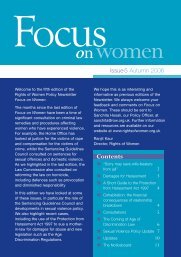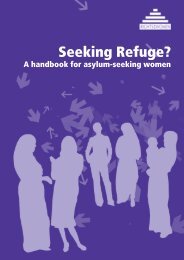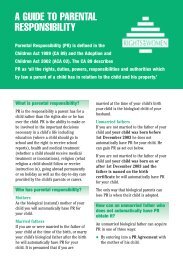DOMESTIC VIOLENCE, IMMIGRATION LAW AND - Rights of Women
DOMESTIC VIOLENCE, IMMIGRATION LAW AND - Rights of Women
DOMESTIC VIOLENCE, IMMIGRATION LAW AND - Rights of Women
Create successful ePaper yourself
Turn your PDF publications into a flip-book with our unique Google optimized e-Paper software.
• The ‘exceptional’ requirements 7<br />
For people applying for leave to remain because they have a child in the UK, that person<br />
must have a ‘genuine and subsisting’ parental relationship with the child, who must be under 18.<br />
The child must either be a British citizen or have lived in the UK continuously for over 7 years. And<br />
it must not be reasonable to expect the child to leave the UK.<br />
For people wishing to stay in the UK on the basis <strong>of</strong> a relationship with a partner, they must<br />
have a ‘genuine and subsisting relationship with a partner who is in the UK and is a British Citizen,<br />
settled in the UK or in the UK with refugee leave or humanitarian protection, and there are<br />
insurmountable obstacles to family life with that partner continuing outside the UK’.<br />
• What if I have strong family and private life, or a strong claim under the ‘best interests <strong>of</strong><br />
the child’ but I don’t fit these new rules?<br />
Very important: it is clear from para EX.1 that not everyone who would have been granted<br />
Discretionary Leave would qualify under these Rules for this 10-year route. This is because <strong>of</strong> the<br />
very precise way the UKBA have tried to define how strong a person’s art 8 ECHR rights must be<br />
before they will grant leave. In relation to children, the new rules require that ‘it would not be<br />
reasonable to expect the child to leave the UK’. In relation to adults in relationships, the new<br />
rules require that there must be ‘insurmountable obstacles’ to family life continuing outside the UK.<br />
Neither <strong>of</strong> these requirements fit with how the UK House <strong>of</strong> Lords and Supreme Court have<br />
analysed family life or the ‘best interests <strong>of</strong> the child 8 . This means that people with art 8 ECHR<br />
claims, and claims based on having a British child or child with ILR here in the UK, may have a<br />
right under art 8 ECHR and/or the ‘best interests <strong>of</strong> the child’ which has been upheld in the UK or<br />
European Court judgments 9 , but may have to take legal action (either an appeal to the First-tier<br />
tribunal or a judicial review) to be granted leave to remain. This will be very difficult once legal aid<br />
is withdrawn for immigration cases.<br />
• If I am granted leave in the ’10-year route’ will I be able to claim benefits?<br />
Not everyone admitted to the ’10-year route’ on grounds <strong>of</strong> art 8 ECHR or ‘best interests <strong>of</strong> the<br />
child’ will be allowed access to public funds. The UKBA Guidance 10 states than a person given<br />
leave to remain on the 10-year route will only be granted access to public funds if they show they<br />
are destitute. The legal test will be the same as the legal test for asylum-seekers:<br />
A person is destitute if:<br />
(a) They do not have adequate accommodation or any means <strong>of</strong> obtaining it (whether or<br />
not their other essential living needs are met); or<br />
7 Para EX.1 <strong>of</strong> Appendix FM at<br />
http://www.ukba.home<strong>of</strong>fice.gov.uk/policyandlaw/immigrationlaw/immigrationrules/app-family-members/exception/<br />
8 The legal test for family life with a child in the UK was set out in ZH (Tanzania) v Secretary <strong>of</strong> State for the Home<br />
Department [2011] UKSC 4, which stated that the best interest <strong>of</strong> the child must be a primary consideration, which<br />
meant that the best interests <strong>of</strong> the child had to be determined before considering whether it was proportional to remove<br />
the applicant. The legal test for family life between adults was set out in Chikwamba v Secretary <strong>of</strong> State for the Home<br />
Department [2008] UKHL 40, and the House <strong>of</strong> Lords judges explicitly disapproved <strong>of</strong> any legal test based on<br />
‘insurmountable obstacles’.<br />
9 ZH Tanzania and Chikwamba, see previous footnote<br />
10 The Guidance on public funds is at section 12 <strong>of</strong> the new guidance on family migration, at:<br />
http://www.ukba.home<strong>of</strong>fice.gov.uk/sitecontent/documents/policyandlaw/IDIs/chp8-<br />
annex/overarching_family.pdf?view=Binary<br />
7
















